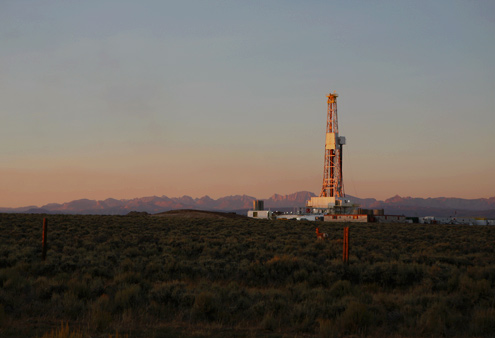Podcast: Play in new window | Download
Subscribe: RSS

It’s not just a drilling rig, it’s a fracking rig, and it has to be watered with millions of gallons if it is going to flourish.
Here’s a lovely circle of life: global warming caused in large part by burning oil has contributed to a drought that is making it impossible for the oil bidness to sustain its over-hyped oil boom in the Bakken oil shale formation under Montana and North Dakota. And that’s just one reason the boom will soon be busted.
Watch the Sunday talk-show commercials and you will be hard put not to believe that the United States is enjoying a petroleum bonanza that has put it within spitting distance of energy independence and a new industrial revolution. As many who are not employed by oil companies have written (including me, here) the prospects for energy independence for this country can realistically be estimated at between zero and none.
(To their credit, the oil propagandists seldom actually say we can achieve it, their commercials usually say the new era of petroleum plenty will move us toward independence, and won’t that be a wonderful thing. But being independent is pretty much like being pregnant, you either are or you aren’t.)
Independence aside, all the loose talk about the “new American age of oil” has served among the uncritical to discredit the theory of peak oil. Propounded by oil-company geologist M. King Hubbert in the 1950s, the theory says that any oil well — also any oil field and indeed all the oil fields in the world combined — will yield tons of oil when young, then inevitably peter out. The famous Hubbert Curve tracking the theoretical output starts and ends at zero. Just a matter of time.
The discovery of the Alaska oil fields and the building of the Alaska pipeline in the 1970s were thought by many to have destroyed Hubbert’s prediction that US oil would peak in about 1970. But US oil production did peak in the 1970s. The Alaska bonanza was a minor blip on the curve’s steady descent toward zero. That is what the Bakken boom is going to be. Not a stairway to the stars, just a bump on the way to the basement.
The realities of the new American oil boom, like the realities of the natural gas boom, are far different than their portrayal on television. Both depend on fracking, a process using dozens of noxious chemicals and millions of gallons of water, to blast the oil or gas loose from the shale in which it’s trapped. Fracking is expensive, and requires a relatively high price for its product to make money for its practitioners. Fracking is dangerous to fresh water supplies, both on the surface (from the tons of toxic waste water it generates) and underground (where it is blowing toxic chemicals God knows where). The bloom has been coming off the gas-fracking business for a while.
Now comes a new study of the oil-shale-fracking boom in Montana, that details a breathtaking increase in oil production in that state to 100,000 barrels a day by 2006. Then a breathtaking decline to 60,000 bpd today. [The study is reported in detail by The Oil and the Glory, a blog for Foreign Policy Magazine.] Just another Hubbert curve. The same study pegs the useful life of an oil-fracking well at seven years. North Dakota is about two years into its oil ka-boom. Do the math.
And that — the notion that in about five years the North Dakota boom will be a slump — turns out to be the best case scenario. The worsening drought affecting 60 per cent of the country is hampering the ability of frackers to get the water — up to 12 million gallons of water– they need to operate a fracking well. Even in Pennsylvania, two counties have suspended permits for frackers to draw water from rivers. In Kansas, farmers who practically gave their well water away to the frackers for 35 cents a barrel have doubled their prices — when they sell at all. Analysts quoted by CNN forecast that lack of water in the near term could cut production by 5 – 10 per cent.
And the long term? See above. There is no long term.